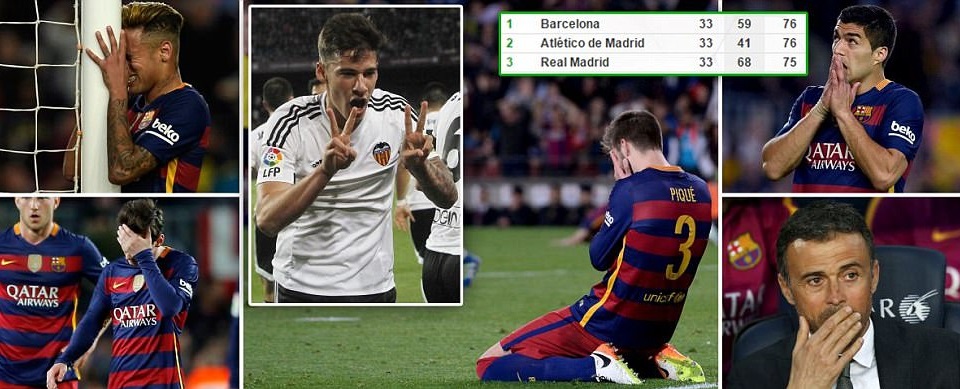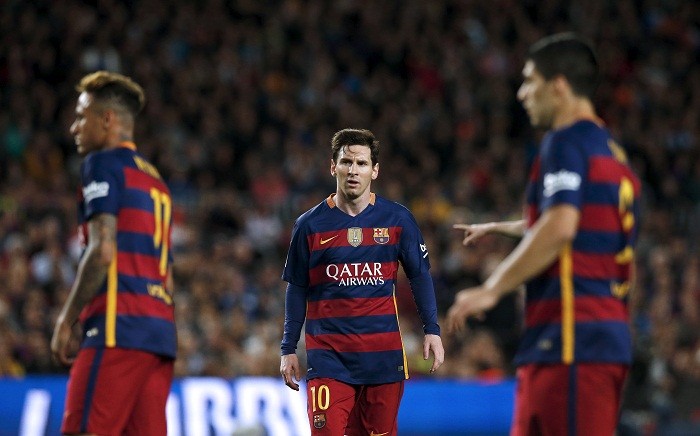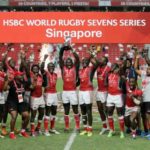With that nine-point buffer now gone, Luis Enrique’s side are looking at those remaining five league games as if they are all cup finals – which they also have one of next month against Sevilla in the Copa del Rey.

It could still be a double for Barca, but even that would feel like a disappointment in a campaign where for large parts they looked capable of becoming the first team to win back-to-back Champions Leagues.
People were wondering if they were better than Pep Guardiola’s side. There was talk of Neymar having overtaken Cristiano.
All of that has gone quiet after the Nou Camp club slumped to a run of four defeats in five games.
So what’s behind their dip? Our man in Spain, Ed Malyon, gives us five factors:
- Luis Enrique’s decisions
Inevitably when results start going south the manager will take much of the blame and Luis Enrique is no different.
When asked on Wednesday night, deep in the bowels of the Vicente Calderón, how responsible he was for their Champions League exit at the hands of Atletico Madrid, he said:
“99.9 per cent… no, 100 per cent. As the manager I’m ultimately responsible so it’s on me. 100 per cent.”
But while much of that is distraction and protecting his players, a practise perfected by Sir Alex Ferguson and taken in a different direction by Jose Mourinho in recent years, Luis Enrique can quite fairly shoulder some of the blame.
When the Austrian tersely insisted throughout the season that he wouldn’t rest any of the members of his ‘MSN’ frontline it raised a few eyebrows, with Barcelona regularly one of the teams with the highest amount of fixtures in a calendar year. Add in the fact that this season they travelled to Japan for the Club World Cup and the travel and fatigue begins to wear.
Enrique has made some puzzling decisions recently While Luis Suarez has been up-and-down in recent weeks, it’s Messi and Neymar who have been most criticised. But these are two players who both played in the Copa America last summer, both played in the World Cup the summer before and who have racked up an incredible amount of gametime.
Not even resting them but taking them off in games that were beyond the opposition would have been a sensible move, but Luis Enrique’s commitment to running the trio into the ground could prove costly.
It also contributed to his bizarre decision to make no substitutes in the defeat to Valencia on Sunday night.
With tiring legs and needing goals the need for a change was obvious but Luis Enrique left the likes of Dani Alves sat on the bench twiddling their thumbs as passes went astray, crosses zipped behind their intended recipients and shots flew wide of the goal.
“I didn’t make any changes because it would have been unjust to the 11 on the field,” the Barca boss would claim. “They were all at a very high level.”
Not the case.
All in all very puzzling.
- Fatigue
As above, that tiredness has certainly had a negative effect on Barcelona’s superstar front three which, at times this season, has been simply unstoppable.
But it is simply impossible for such an accumulation of games to not start impacting performance.
Periodisation in recovery is absolutely key and there are players in this Barcelona team who are clearly suffering. Luis Suarez has started 30 La Liga games and not missed a minute. He’s started nine Champions League games and not missed a minute. When you’re talking about a team that has hammered sides this season it makes no sense, but that’s on Luis Enrique, the point that concerns the player is that it’s simply not possible to keep playing at an elite level when you are so far off peak condition.
Suarez and Neymar both appear among the top 15 of outfield players in La Liga for minutes played, while Messi would almost certainly be above both had he not spent eight weeks out with a knee injury.
But that brings us to our next point….
- Mistakes in recruitment
Fatigue and tiredness is a problem that affects every side but one that is exacerbated by a lack of squad depth.
When Messi was out with his injury in the Autumn, the next in line were Munir El-Haddadi and Sandro Ramirez. The pair played 16 games between them in La Liga and Europe but mustered just three goals – all of them Munir’s.
Come January, the struggles of the young pair and Rafinha’s injury meant that Barcelona were in the market for a player that become known by those at the club as “the fourth forward”.
They needed a player happy to sit behind the MSN but good enough to make an impact when stepping in for the superstars. They needed to be a flexible player and able to play all across the front three, but chiefly as relief to Luis Suarez who had no natural replacement. In short, a signing like Henrik Larsson had once been for the club.
Sporting director Robert Fernandez analysed all of the options – including Larsson-style veterans like Dirk Kuyt and Luca Toni, cut-price options like Red Bull Salzburg’s Jonathan Soriano and youngsters like Rennes’ Ousmane Dembele – but the main problem was self-imposed budgetary restrictions that prevented them buying the man who would emerge as their top target, Nolito.
The Spain international was outstanding in the early season and, as well as being a former Barcelona player, had played under Luis Enrique at Celta Vigo. The versatile forward was the perfect fit but just couldn’t be bought with what Barca had available to spend.
So they instead zoned in on another La Masia product, Denis Suarez, who was impressing at Villarreal but had a €3million buyback clause in his contract for the summer. Despite their best efforts, however, Barca couldn’t convince Villarreal to part with the youngster and although he will almost certainly sign this summer, his arrival could have added impetus to the side in January.
Indeed, that was kind of the plan where it came to Arda Turan and Aleix Vidal, two players that arrived last summer knowing they couldn’t register with, or play for, the Nou Camp club until the New Year due to FIFA’s ban.
While Turan showed early promise, his unsuitability to playing in Barca’s midfield three has been exposed in recent matches and Aleix Vidal is now third-choice right-back.
Neither have become the extra quality that this squad needed last summer, and if the points keep dropping then last summer’s transfer activity, as well as January’s lack of it, will come under even more scrutiny.
Paradoxically, Barcelona have actually hit their worst form of the season when their squad depth has been at its best, but the problem remains that the talent found on the bench is way, way below the first-teamers.
- Neymar’s decline
It feels unfair to single out individuals but the reason that Neymar stands out is because, for the first few months of the season, he was probably the best player in Europe. Throughout the Autumn and particularly while Messi was out injured, the Brazilian was unstoppable and would score or make goals with an almost laughable ease.
In several games this season, when Barcelona have properly clicked, he has looked like the world-beater this club knew he would become. The talk was not just about whether he had overtaken Cristiano Ronaldo to become the second-best player in the world, but whether he had surpassed teammate Messi.
Those discussions have been well and truly put to bed in recent weeks, with a significant dip in form just when his side needed it least.
Unable to make any impact against Atletico Madrid as Barca were eliminated from the Champions League, the Brazilian superstar has not been himself since going on a club-sanctioned trip to Brazil for his birthday (incidentally, the second year running that he has been suspended at the exact time when fixtures would allow him to return home to celebrate).
In number form, Neymar scored 18 goals in the September, October and November, while February, March and April have seen him net just six times.
A 66 per cent downturn in production is serious cause for concern and his team need him to bounce back in these final five fixtures.
- Bad luck
Luis Enrique said it was “evident” and, having seen a cross deflect into their own net off Ivan Rakitic against Valencia, shorlty before a raft of chances just failed to fall for them, it was impossible to argue with Barcelona that this was the latest chapter in their little book of recent bad luck.
“It would be normal to be frustrated with the referee, the opposition, the bad luck,” said the Barca coach but, in truth, there’s little you can do.
Valencia, the victims of such bad luck themselves this season, will tell them that it’s just their turn.














